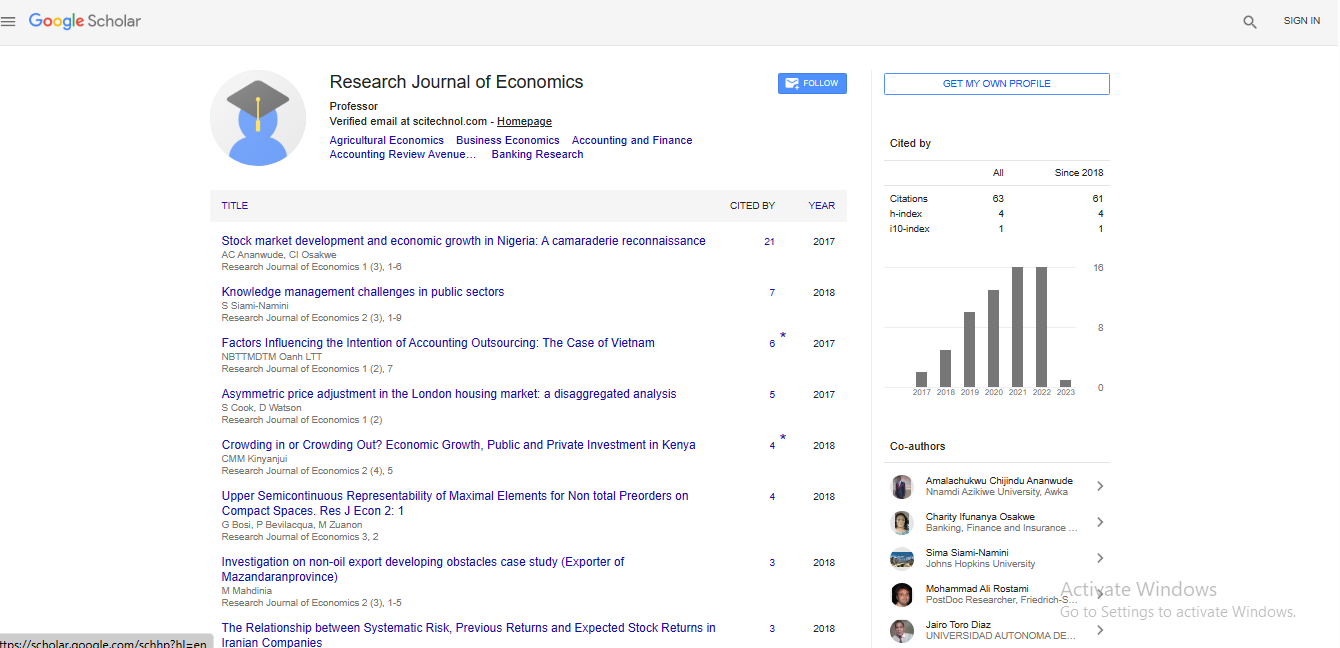Opinion Article, Res J Econ Vol: 7 Issue: 1
Role and Benefits of Total Merchandise Trade in Economic Development
Nguyen Malichan*
Department of Economics and Finance-DEF.UP, School of Economics and Management, University of Porto, Portugal
*Corresponding Author: Nguyen Malichan
Department of Economics and
Finance-DEF.UP, School of Economics and Management, University of
Porto, Portugal;
Tel: +3514462584639
E-mail: nguyenmalic@fep.up.pt
Received date: 02 January, 2023, Manuscript No. RJE-23-89737;
Editor assigned date: 05 January, 2023, PreQC No. RJE-23-89737 (PQ);
Reviewed date: 19 January, 2023, QC No. RJE-23-89737;
Revised date: 27 January, 2023, Manuscript No. RJE-23-89737 (R);
Published date: 03 February, 2023, DOI: 10.4172/RJE.1000125
Citation: Malichan N (2023) Role and Benefits of Total Merchandise Trade in Economic Development. Res J Econ. 7:1
Description
Total merchandise trade refers to the value of goods that are bought and sold between countries. This includes exports and imports of goods such as raw materials, finished goods, and services. Total merchandise trade is an important indicator of a country's economic health and its integration into the global economy.
It can be influenced by a variety of factors, such as exchange rates, tariffs and other trade barriers, and global economic conditions. The COVID-19 pandemic has also had a significant impact on global trade, with many countries implementing travel restrictions and other measures that have disrupted supply chains and reduced trade volumes.
International trade can provide many benefits to countries, such as access to new markets and increased competition, which can lead to increased efficiency and innovation. Additionally, increased trade can create new job opportunities and help to raise living standards. However, trade can also have negative effects, such as the displacement of jobs and the potential for environmental degradation. Total merchandise trade, which refers to the exchange of physical goods between countries, plays a crucial role in economic development.
Here are some ways in which total merchandise trade contributes to economic development:
Increased efficiency
Trade allows countries to specialize in the production of goods that they can produce most efficiently, while importing goods that other countries can produce more efficiently. This specialization allows for greater efficiency in production and can lead to lower costs and increased productivity.
Expanded markets
Trade opens up new markets for goods, which can increase demand and lead to economies of scale. This can beparticularly important for small or developing economies that may have limited domestic markets.
Access to resources
Trade allows countries to access resources that they may not have domestically, such as raw materials or technology. This can help countries to expand their production capabilities and become more competitive in global markets.
Job creation
Increased trade can lead to job creation, particularly in exportoriented industries. This can help to reduce unemployment and increase incomes in developing countries.
Transfer of knowledge
Trade can also lead to the transfer of knowledge and technology between countries, which can help to improve productivity and stimulate innovation.
Benefits
The benefits of total merchandise trade are not limited to any specific country or group of countries.
• International trade can bring benefits to both developed and developing countries, although the nature and extent of those benefits may vary depending on a variety of factors, such as a country's level of development, its resource endowment, and the structure of its economy.
• For developing countries, increased trade can provide access to new markets and increased demand for their products, which can help to create jobs and increase incomes. Additionally, increased trade can facilitate the transfer of technology and know-how, which can help to improve productivity and competitiveness.
• Developed countries can also benefit from increased trade by gaining access to new markets and sources of goods, which can help to increase efficiency and lower costs. Additionally, increased trade can help to promote innovation and technological advancement.
The benefits of trade are not equally distributed among all countries and can be influenced by a variety of factors, such as the terms of trade, the distribution of gains within countries, and the potential for environmental and social costs. It is important for countries to design their trade policies and agreements in a way that promotes equitable and sustainable economic growth for all.
Total merchandise trade can bring many benefits to countries, it is important to carefully consider the potential costs and benefits of increased trade and to ensure that trade policies are designed to promote overall economic growth and sustainability.
 Spanish
Spanish  Chinese
Chinese  Russian
Russian  German
German  French
French  Japanese
Japanese  Portuguese
Portuguese  Hindi
Hindi 